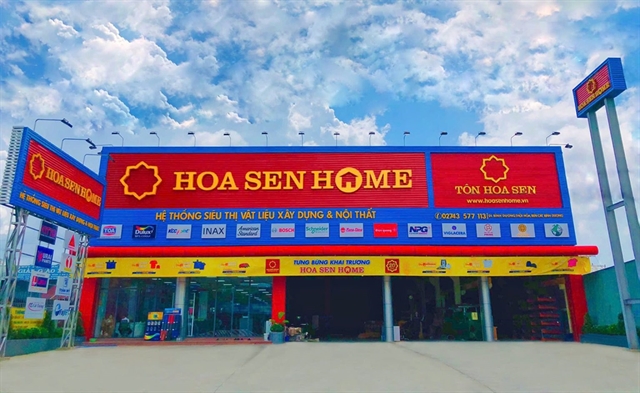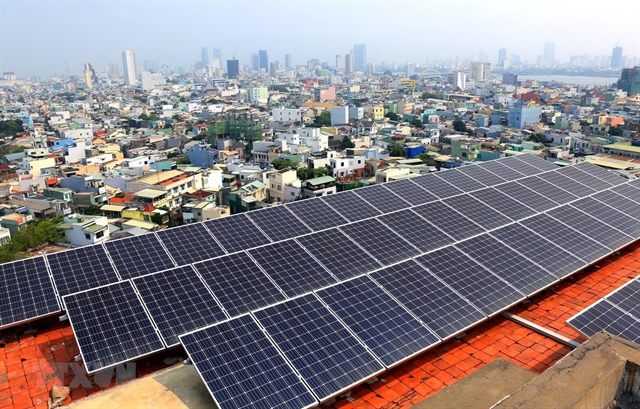 Economy
Economy


|
| Nearly 45,300 rooftop solar power projects have been put into operation nationwide by August 23. — VNA/VNS Photo |
HÀ NỘI — The Việt Nam Renewable Energy Week 2020 was launched in Hà Nội on Tuesday. It is co-organised by the Việt Nam Sustainable Energy Alliance, the Việt Nam Climate Action Alliance, and the Việt Nam Union of Science and Technology Associations.
This fifth event, “Breakthrough to Recovery and Green Development for a Peaceful Life”, aims to put forward measures promoting sustainable energy development, ensuring energy security, removing barriers, and bolstering green economy recovery and growth.
The four-day event will also offer the chance for stakeholders to contribute to the country’s energy transition in an effective and sustainable manner.
Cecile Leroy from the Delegation to the European Union in Việt Nam said the EU has signed numerous cooperation agreements with Vietnamese ministries and sectors in sustainable energy transition.
It has also provided its Vietnamese partners with assistance in energy development policies and in raising capacity, awareness and energy access among the public.
The EU stands ready to share knowledge in projects, finance and the legal framework for green recovery and development, she said.
Renewable energy currently accounts for 10 per cent of the national grid’s total capacity and Việt Nam has emerged as a leader in the development of renewable energy resources in Southeast Asia.
Rooftop power
Rooftop solar power in Việt Nam has exploded with 1,000MWp in just two years, however, there are still many obstacles, especially policies, finance and initiatives to promote its development.
A seminar titled “Developing rooftop solar power in Việt Nam: Benefits, bottlenecks and solutions" was held within the framework of the event.
Việt Nam Electricity (EVN) reported that the country has a total of 45,299 rooftop solar power projects put into operation nationwide by August 23, with a capacity of 1,029MWp, output reaching about 500,692MWh, emissions reduction of about 457,132 tonnes of CO2 (equivalent to 77,257 TOE).
Ngụy Thị Khanh, director of Green Innovation and Development Centre (GreenID), said that the supporting price mechanism has helped Việt Nam achieve 1,000MWp for rooftop solar power in the past two years, and at the same time create conditions for thousands of domestic and foreign investors and enterprises to participate in the market from research, production to distribution.
However, the result was low compared to the technical potential estimated at 48,000MWp of rooftop solar power, said the director.
"There are still many bottlenecks that need to be removed, especially related to policies and finance to promote rooftop solar power development," said Khanh.
Trần Viết Nguyên, an EVN representative, said that rooftop solar power had generated a lot of electricity on the grid.
To continue to promote rooftop solar power development, EVN had publicised processes, procedures, and created maximum conditions for investors in the process of signing the connection agreements, and power trading contracts.
However, Nguyên said that in reality, the communications and promotion for rooftop solar power were still limited; many households were hesitant in investment due to a lack of information about product quality, equipment installation, operation and warranty units.
At the same time, the cost of equipment and installation was still high, there were no policies to encourage household customers to invest and install; there were no national technical standards for rooftop solar power equipment and systems, he added.
To promote rooftop solar power projects, Nguyên proposed the Government, ministries, sectors and investors continue to study initiatives, mechanisms and supporting packages to reduce costs of installation and operation, then it was possible to replicate rooftop solar power, especially for low-income households.
In addition, EVN also proposed the Ministry of Industry and Trade and the Ministry of Science and Technology to soon study and promulgate safety standards and techniques for rooftop solar power. — VNS